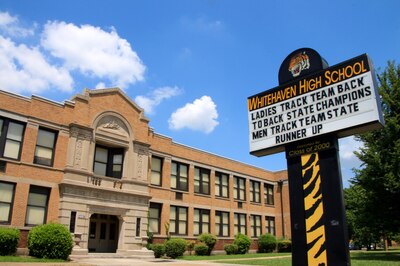As a mother of three who has lived in Memphis’ Whitehaven neighborhood for almost 25 years, Regina Mosley sees the area high school as an anchor in the midst of a rapidly changing education landscape.
The high-performing Whitehaven High school is also the anchor of the Empowerment Zone, one of Shelby County Schools’ newest intervention programs. It will more than double in size by adding six schools this fall.
The Empowerment Zone, which will enter its third year in August, is a neighborhood-centric approach to improve schools as the district seeks to include a larger group of people who are committed to seeing the school do well.
Mosley hopes the school improvement model will make the 107-year-old school shine even more.
“There’s no other foundation I’ve seen that stands the test of time because of the unity of the people: alumni, teachers, students, parents, everybody is involved,” said Mosley, who is also a parent leader for area schools.
Over the last eight years, Tennessee has worked to improve performance at its struggling schools, and state test scores have improved as a result — especially in Memphis, where most students are from low-income families. The results of the Empowerment Zone have been promising, but some are worried about the next phase, when more elementary schools will be added in the coming school year. All but one school in the zone saw academic growth this school year.
Created in 2016, the Empowerment Zone was meant to shield a cluster of low-performing schools in Whitehaven from takeover by the state. Superintendent Dorsey Hopson leaned on Vincent Hunter, who has been principal of Whitehaven High for 14 years, to collaborate across schools on lesson plans so teachers could learn from each other. Hunter also brought in college-student tutors to reduce the teacher-to-student ratio through a partnership with Peer Power and the University of Memphis.
Teachers are offered signing bonuses and have an extra set of academic coaches who specialize in their grade levels. Before entering the Empowerment Zone, Hunter invites principals into team planning across the zone so they can understand how it works.
The schools are all governed by the Whitehaven Empowerment Zone Leadership Council, which is composed of about 30 parents, teachers, students, and community members who meet monthly to go over reports about student enrollment and test scores, and to strategize.
“That creates a sense of unity for us. We want to always be viewed as family. Plus it’s personal to me,” said Hunter, a Whitehaven high graduate who started teaching at his alma mater in 1994. About 45 staff members across the zone are also graduates of the neighborhood high school, he said.
Whitehaven Empowerment Zone schools by year
- 2016-17: Whitehaven High, Havenview Middle
- 2017-18: Holmes Road Elementary, A. Maceo Walker Middle
- 2018-19: Geeter K-8 (formerly Geeter Middle and Manor Lake Elementary), Whitehaven Elementary, Oakshire Elementary, Robert R. Church Elementary, and John P. Freeman Elementary
The community involvement appears to be paying off. Havenview Middle School, the first to enter the Empowerment Zone, improved about five percentage points beyond the bottom 3 percent of the state’s low-performing schools in one year. A. Maceo Walker Middle School, which made its first appearance on the state’s priority list in 2014, is almost out of the bottom 10 percent of schools in the state.
Parents are noticing, and so is the state. Enrollment is up as much as 21 percent at Havenview Middle since last school year. The Tennessee Department of Education approved the district’s proposal to fold Geeter Middle into the zone when it released its plans for the city’s lowest-performing schools.
“We know that strategy works, there’s no question about that,” said Hopson, who is also a Whitehaven high graduate.
But some teachers and administrators are worried about the next phase of the project. Holmes Road Elementary, the first elementary to join the zone, performed poorly on an exam given earlier this year. Yet the Empowerment Zone is set to add five elementary schools this fall, two of which are already performing well on state tests.
Hopson attributed Holmes Road’s first-year challenges to staffing vacancies when it was “fresh-started.” When a principal is hired, that person can bring on all new teachers and staff. If their evaluation scores are low, or the former employees aren’t offered jobs, they can be assigned to other schools. Some classrooms were covered by temporary teachers who have been reassigned from other schools.
Hunter, the executive principal over the Empowerment Zone, said the public shouldn’t put too much stock in the early progress reports.
“TNReady is the true measuring stick,” he said of the state’s standardized test. Results from this year’s test are expected in the fall.
Eddie Jones, the president of the zone’s leadership council, said it was too soon to tell if the troubles at Holmes Road were growing pains, or were a flaw in the model.
“They just got there. You haven’t had an opportunity to see if it’s working or it’s not,” Jones said.

Three of the schools being added to the zone next year — Geeter K-8, Robert R. Church Elementary, and Oakshire Elementary — have been fresh started. That strategy has worked well for the Innovation Zone, the flagship program run by the district that has outpaced state schools in boosting test scores — but only if the number of teachers leaving isn’t too high.
Some teachers thought it was too early to discuss a fresh start because they said they were promised extra support.
“The promise wasn’t kept,” said Annette Harris, a teacher who opted to retire instead of re-apply for her job. “What the new people are going to receive is what we were promised,” she said about the coaching.
Hopson said additional teacher coaching at those schools was planned, but after looking closely at testing data, the leadership council and district leaders moved up the timeline for a fresh start.
“Knowing where the data was last year, the community felt like we didn’t have time to figure out if we needed to go all in on the treatment,” he said. “The data suggested that we needed to be more aggressive.”
But Hunter said the only advice promised before schools entered his program was to principals. Additional teacher coaching, he said, is reserved for after the staffing changes. The intent is not a full turnover, he said, but only 35 of 125 teachers have been retained so far at the three schools that have been fresh started for the fall.
“We want the children in those particular settings to have a familiar face they’re used to seeing so they feel comfortable,” he said.
The Empowerment Zone’s scope is expanding next year beyond schools in the high school’s feeder pattern. Some of the schools being added send students on to Fairley High, a state-run charter school. One of those is Geeter Middle, which will become a K-8 school when Manor Lake Elementary students are added to it next year.
Hunter was open about his intentions to keep students out of the state-run district during a meeting in March with parents and teachers at Manor Lake.
“If we sit back and do nothing and are not aggressive in our treatment, then now we become victims or potential victims of the Achievement School District,” he said.
“All they know is the child did not perform well on a test. They don’t understand that the child might not have eaten last night,” he said. “None of those things show up in a number, and it’s totally not fair.”

